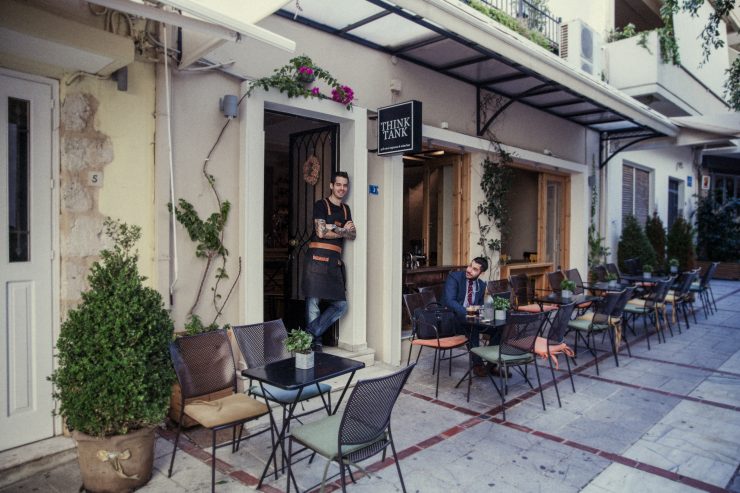
It’s mid-morning in Heraklion, Crete. Nestled along a leafy, pedestrianized alleyway on the edge of the old town of Crete’s capital, Think Tank cuts a decidedly modern figure, its minimal design and wood accents standing out proudly from the elaborate stonework of the ancient city that surrounds it.
Think Tank proudly calls itself the first Third Wave coffee shop in Crete. As is the case with many things Cretan, things are done a little differently here. Crete only joined Greece a hundred years ago, and through the intervening century it’s managed to preserve a unique identity. Owners Markos Xenogianakis and Antonis Kounenós have brought Cretan flair to the modern coffee shop, expertly combining the traditional with the international, offering the people of Heraklion something new, yet familiar.
On this particular morning, I spoke to head barista Savvas-Victor Baldinis. Baldinis is a veteran who’s been pulling shots for 11 years and running training courses for three. He’s also the founder of Beverands, an outfit offering training seminars for aspiring baristas.
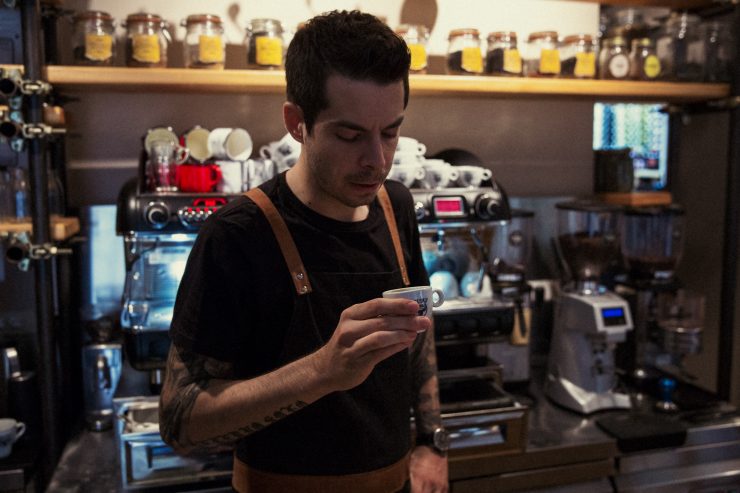
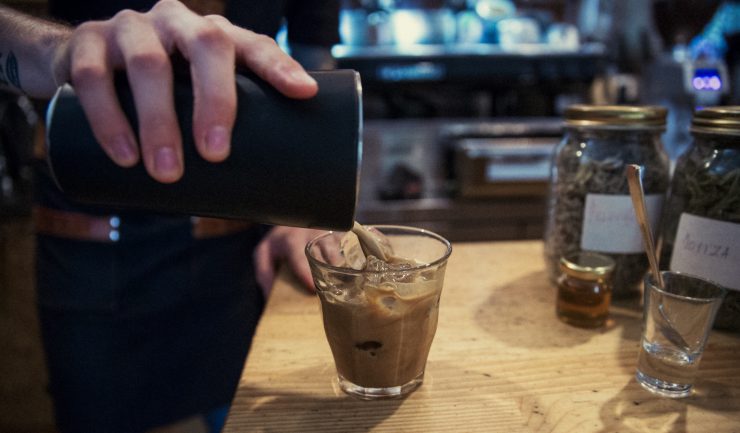
Despite it being the middle of October, the morning is already heating up. Baldinis welcomes me with a frappé. It’s a classic Greek iced coffee drink, traditionally made with ice, sugar, and—bear with me—Nescafé. In a mixer, the ingredients are whipped into a smooth froth, which is then topped off with water, evaporated milk, and ice.
Baldinis, of course, eschews the Nescafé for a shot of espresso made from Think Tank’s Habit blend, roasted by Athens-based Kudu Roasters. He topped it off with cold bottled water and a few large ice cubes. The espresso-frappé he gave me was silky-smooth, sweet, and mild. In the hot mid-morning sun, I drank it in seconds.
Think Tank is doing more than reinventing the frappé, however. Baldinis rotates the beans on offer every few weeks. The exception is his aptly-named trademark blend, Habit, which is always available. The shop boasts an impressive range of equipment: the gleaming San Remo Verona RS espresso machine is flanked by three grinders: two Anfims and a Fiorenzato F64.
The next tester up was a cold-brewed Yirgacheffe, also roasted by Kudu, served in a tiny, chilled bottle. The presentation charmingly echoes that of the ubiquitous Cretan digestif, raki, served after meals with slices of cold watermelon. The cold brew was clear chocolate brown, smooth—the Yirgacheffe’s typical acidity surprisingly mild.
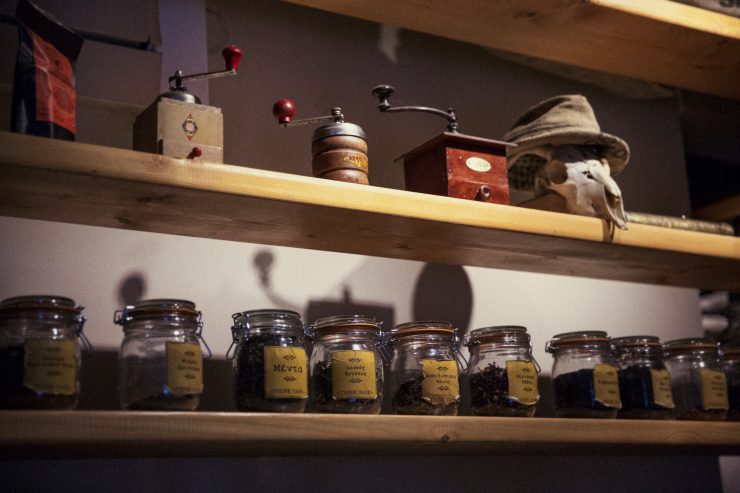
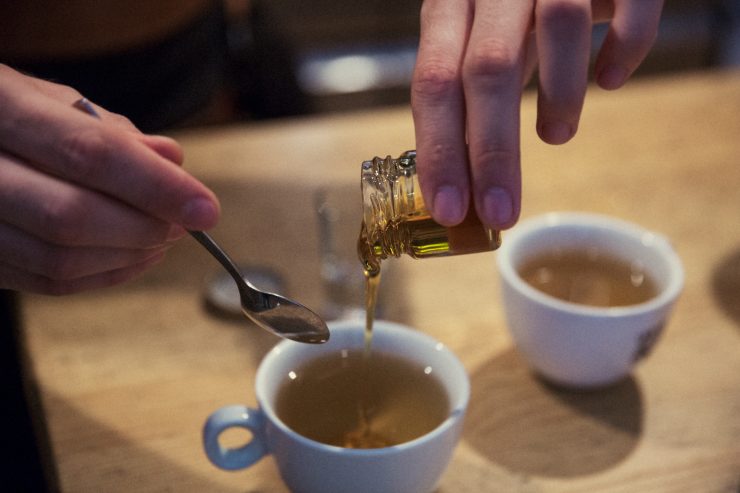
At this point, I was feeling decidedly caffeinated, so we moved onto Think Tank’s Cretan specialty: herbal teas. For centuries, Crete has been known for the quality and sheer variety of wild herbs able to be gathered from its hillsides and rugged mountaintops. Over 130 varieties of edible wildflowers and herbs are native to the island, to be found nowhere else on Earth.
A dozen tea blends line the shelves at Think Tank. Overwhelmed with choice, I deferred to Baldinis’ expertise, and tasted a blend of mint, chamomile, orange peel, cinnamon, and a local herb called malotira, gathered from nearby hillsides. He steeped it for six or eight minutes and then decanted it into small cups, one of which he sweetened with thyme honey, another local delicacy. The bees that make the specialty honey spend their days pollinating the tiny purple flowers of the thyme plants that grow wild all over the island, lending the honey more than a touch of the herb’s slight mintiness.
If you happen to come in the evening, Think Tank serves yet another Cretan specialty: wine. Choose one of the more than 50 local and international wines on offer and climb up the stairs to enjoy a glass on their charming roof terrace, alive with potted herbs and plants.
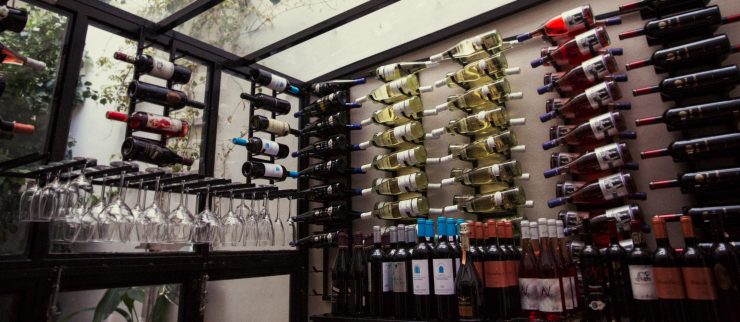
Bringing modern coffee to Crete hasn’t been easy. “Most people, when they come to a coffee shop, they don’t want a lecture. Coffee isn’t their job, and they don’t feel the need to research it,” says Baldinis. He says most Greeks, if they think about coffee at all, tend to prefer Italian espresso roasts—standard for the Mediterranean. In that case, he says, “I give them something they’re familiar with. Habit is a balanced, familiar-tasting blend, but still high quality. I’m not gonna force an acidic Yirgacheffe on a person who’s not expecting that.”
For a journalist used to hearing all kinds of extreme opinions about coffee, Baldinis’ relaxed perspective was as refreshing as his frappé. “I’m not here to tell someone how to enjoy his coffee. If he wants a coffee with milk, I don’t tell him to do something different.” He shrugged, smiling amicably, “My job is to give the customer something he likes, to understand what he wants and give it to him.”
Think Tank is located at Andreou Kritis 7, Iraklio 712 02, Greece. Follow them on Facebook and Instagram.
Conor O’Rourke is a freelance journalist based in Berlin. His work has appeared in publications such as ExBerliner, Matador, The Hustle, and many more. Read more Conor O’Rourke on Sprudge.
Photographs by Will Emery.
The post Think Tank: Crete’s New Modern Coffee Shop appeared first on Sprudge.

